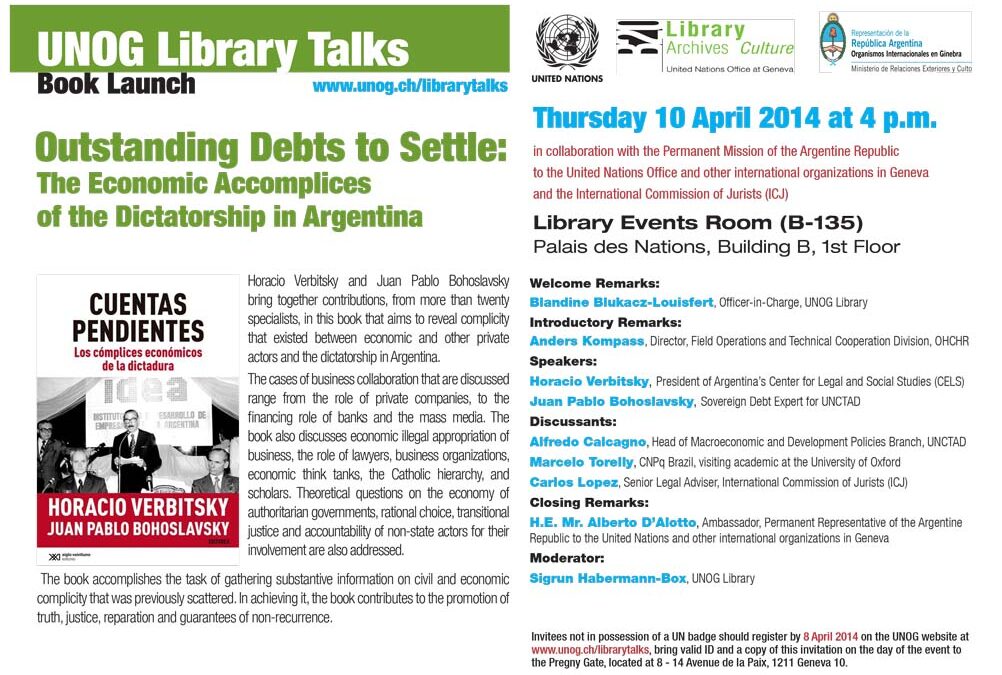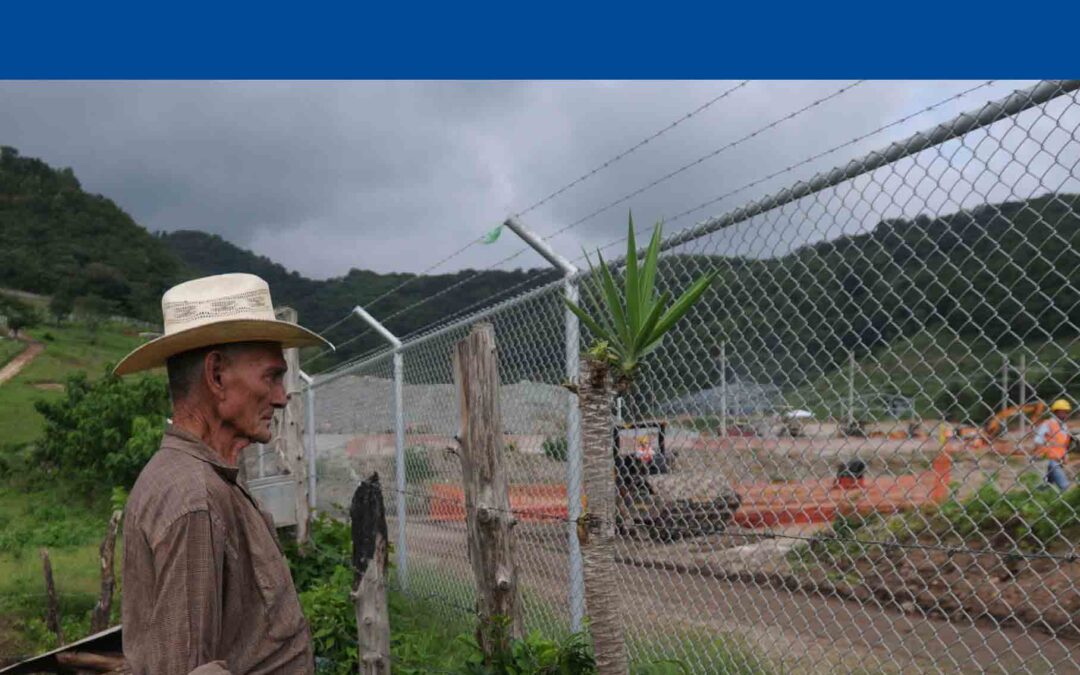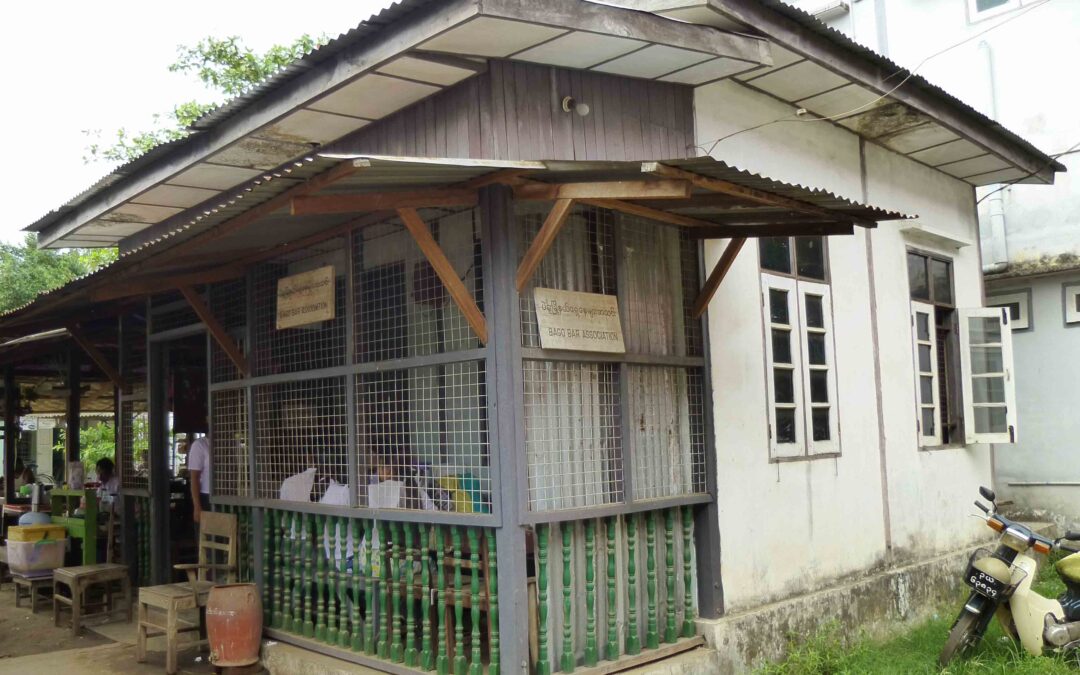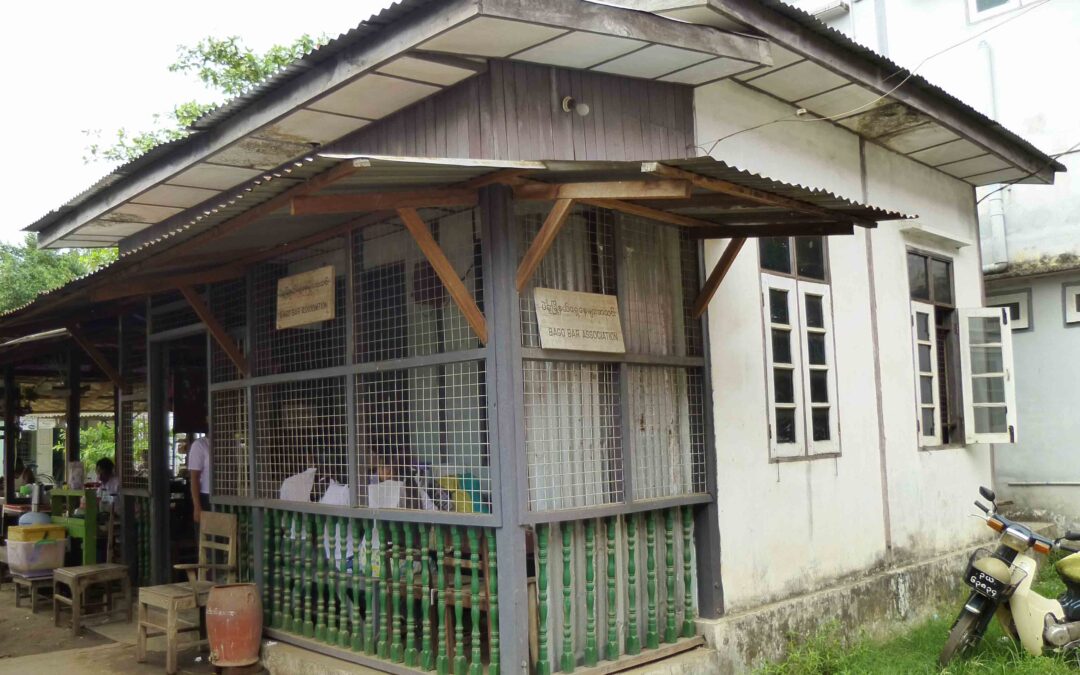
Apr 7, 2014 | Events, News
This is the English title of a book by Horacio Verbitsky and Juan Pablo Bohoslavsky, with contributions from more than twenty specialists, which reveals complicity between private actors and the dictatorship in Argentina.
The book will be launched on 10 April at 4 pm (16.00)in the Library Events Room (B-135) at the Palais des Nations, Building B, 1st floor, in Geneva.
Carlos Lopez, ICJ Senior Legal Adviser on Business and Human Rights will be among the discussants at the event. He contributed one chapter of the book, on corporate complicity.
The cases of business collaboration discussed in the book range from the role of private companies, to the financing role of the banks and the mass media.
The book also discusses economic illegal appropriation of business, the role of lawyers, business organizations, economic think tanks, the Catholic hierarchy, and scholars.
UNOG-launch book corporate complicity in Argentina-news-events-2014 (full invitation in pdf or you can also enlarge the picture)

Mar 28, 2014
La CIJ ha publicado un informe que analiza el sistema jurídico y judicial de Guatemala en relación con las obligaciones y responsabilidades de las empresas.
El informe se enfoca en las vías de recursos legal existentes en virtud del derecho constitucional, derecho laboral, derecho civil y derecho penal, y examina casos concretos como ejemplos de su aplicación.
El informe identifica las deficiencias estructurales, institucionales, normativas, económicas, políticas y sociales en los sistemas jurídicos y judiciales del país que dificultan el acceso a la justicia para las víctimas de abusos de los derechos humanos cometidos por los negocios.
Las limitaciones y los obstáculos para acceder a la justicia son especialmente graves en relación con los pueblos indígenas en un país donde estos han sido históricamente discriminados.
El informe recomienda un conjunto de medidas para fortalecer la independencia del poder judicial, la reforma de varias leyes, el fortalecimiento de las instituciones estatales de protección, el fomento del diálogo entre las partes interesadas y un mayor respeto a los derechos de los defensores de los derechos humanos.
Guatemala – empresas y violaciones a los derechos humanos – report – 2014-spa (Informe en PDF)
Contacto:
Carlos Lopez, Director, Business and Human Rights, carlos.lopez(a)icj.org, +41 22 979 3816
Ramón Cadena, Director, Central America, ramon.cadena(a)icj.org, +50 22 335 3325

Mar 17, 2014 | Advocacy, Non-legal submissions
The ICJ made an oral statement at the UN Human Rights Council, on the need for fundamental reform of the legal system in Myanmar.
The oral statement was delivered during an interactive dialogue with the Special Rapporteur on human rights in Myanmar.
While noting some progress on legal reform to establish the rule of law during Myanmar’s economic and political transition, the ICJ noted that reforms are fragile and legal obstacles continue to block improvements to the extremely poor state of the rule of law and respect for human rights.
The ICJ considers that Myanmar’s judiciary is not yet independent. State authorities continue to exert improper influence on politically sensitive cases.
The ICJ was therefore deeply disappointed to hear the Representative of Myanmar state during the Council session that the Government rejected as “intrusive and prescriptive, infringing upon the national sovereignty” the Special Rapporteur’s basic recommendation that “the Government … Initiate fundamental reforms to establish a judiciary that is impartial and independent, including from the direct control of the Government and the military”.
Systemic problems affect the independence of lawyers, including the poor state of legal education and undue restrictions on licensing. Lawyers in Myanmar lack an independent Bar Council.
The ICJ stressed the need for Myanmar to ratify and implement all core human rights treaties, to cooperate with international human rights mechanisms, and to agree to the establishment of an OHCHR office in the country. At the same time, ICJ emphasised the continued need for a robust mandate for the UN Special Rapporteur on Myanmar.
The full statement may be downloaded in PDF: Advocacy-UN-HRC25-Myanmar-OralStatement-032014
The report of the Special Rapporteur is available here in Word format: SR Myanmar Report March 2014
For further information, please see the recent ICJ report Right to Counsel: The Independence of Lawyers in Myanmar (click to download PDF).

Mar 10, 2014 | Agendas, Events
This side event to the 25th Human Rights Council session will take place on Wednesday, 12 March 2014, 16.00 – 18.00 pm, in Geneva, Palais des Nations, Room XXII.
The members of this panel are in a unique position to highlight on-going challenges to the rule of law in Myanmar and their impact on the enjoyment of human rights.
They will provide personal insight into the important international presence for human rights monitoring, practical challenges facing lawyers concerning the rule of law, and link these issues to sustainable economic development on the ground in Myanmar today.
This panel argues that it is crucial to maintain a robust engagement with the UN human rights mechanisms in order to support and facilitate the reform process in Myanmar and improve the country’s human rights situation.
Speakers:
Tomás Ojea Quintana, UN Special Rapporteur on the situation of human rights in Myanmar
Kyaw Min San, Myanmar lawyer, Pyoe Pin and Justice For All
Daniel Aguirre, International Commission of Jurists, Myanmar
Chair/moderator:
Carlos Lopez, International Commission of Jurists
The presentations by panellists will be followed by an open interaction with the audience. Copies of the recent ICJ report Right to Counsel: The Independence of Lawyers in Myanmar will be available.
Myanmar – HRC25 Side event – March 2014

Jan 20, 2014
The ICJ has submitted to the Committee on the Rights of the Child an alternative report in advance of the Committee’s examination of the fourth and fifth periodic reports of the Russian Federation under the Convention on the Rights of the Child.
The ICJ submission draws the Committee’s attention to concerns related to:
- The detrimental impact of extractive and mining companies’ activities on children’s rights;
- The detrimental impact of asbestos production on children’s rights;
- The impact on children’s rights of the 2014 Winter Olympics in Sochi.
The Committee will examine the fourth and fifth periodic reports of the Russian Federation during its 65th session held in January 2014, following which it will adopt Concluding Observations setting out recommendations to the Government of the Russian Federation.
RussianFederation-CRC65-AlternativeReport-LegalSubmission-2014 (download full submission in PDF)









